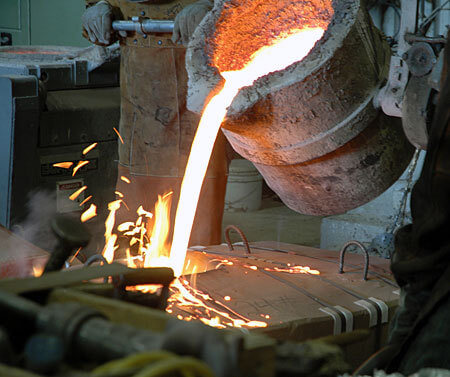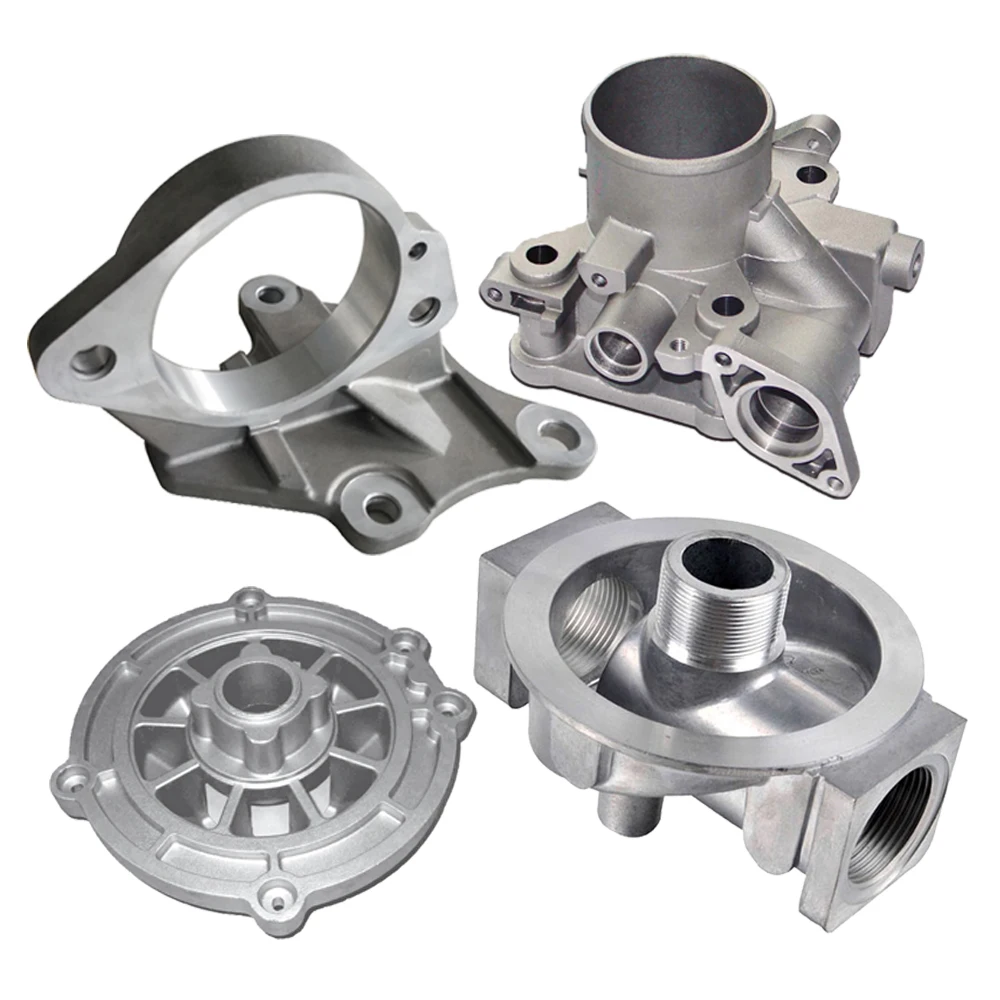The Effect of Cutting-edge Foundry Providers on Sustainable Manufacturing Practices
Cutting-edge shop solutions play a necessary role ahead of time lasting production methods. By incorporating recycling technologies and energy-efficient processes, these solutions significantly reduce environmental impact. Factories can redeem useful products, thus reducing dependence on virgin resources. As automation and lean manufacturing principles get traction, manufacturing efficiency is optimized. The full level of these advancements and their implications for the future of manufacturing stay to be explored.
The Duty of Advanced Recycling Technologies in Foundries
Advanced reusing modern technologies are changing the landscape of shops by boosting product healing and minimizing waste. These ingenious processes enable shops to reclaim important metals and products from scrap, minimizing dependence on virgin resources. By integrating advanced sorting, shredding, and melting strategies, shops can effectively draw out useful materials from discarded products, consequently advertising a round economic situation.
These innovations support the manufacturing of high-grade alloys and elements, making sure that recycled products meet rigorous industry criteria. Consequently, factories are not only enhancing their product effectiveness yet likewise lowering the ecological impact connected with conventional manufacturing techniques
This shift in the direction of advanced reusing not only bolsters economic viability for foundries but additionally straightens with international sustainability goals. Eventually, the consolidation of these technologies stands for a considerable progression in the quest for sustainable production techniques within the shop field.
Power Efficiency: Lowering Consumption in Production Processes
Energy efficiency in manufacturing procedures is critical for sustainable operations. Strategies such as procedure optimization methods, sustainable power combination, and waste warm healing play vital roles in minimizing energy consumption. By concentrating on these areas, producers can considerably minimize their ecological effect while improving performance.
Process Optimization Techniques
A significant number of making centers are increasingly adopting process optimization strategies to enhance power performance and minimize usage. These methods involve examining and fine-tuning manufacturing workflows, identifying bottlenecks, and executing automation to streamline operations. By leveraging information analytics, suppliers can check power usage in real-time, enabling positive adjustments to reduce waste. Techniques such as Lean Production and 6 Sigma concentrate on removing ineffectiveness and enhancing source allowance. Furthermore, progressed innovations like Web of Things (IoT) sensing units supply insights right into tools efficiency, promoting predictive maintenance that avoids energy loss. Generally, these procedure optimization techniques not just add to minimized energy usage but additionally foster a society of continuous renovation within manufacturing atmospheres, lining up functional experiment sustainability objectives.
Renewable Resource Assimilation
Lots of production centers are significantly integrating renewable resource resources to enhance overall power performance and decrease dependence on conventional power grids. This adjustment includes the adoption of solar, wind, and biomass energy, which can greatly reduce functional costs and reduce carbon impacts. By using these lasting power sources, makers not only decrease their ecological effect however likewise enhance energy resilience. Furthermore, incorporating renewable resource systems often involves advanced technologies such as power storage space and clever grid remedies, which maximize power usage and assist in real-time monitoring. This integration sustains makers in achieving regulative compliance and conference sustainability objectives while cultivating development in production processes. Ultimately, renewable resource integration represents a critical shift towards more sustainable production practices and long-term practicality.
Waste Heat Healing
Incorporating renewable power resources sets the stage for additional innovations in energy efficiency, specifically through the execution of waste warm recuperation systems. These systems catch excess thermal power produced throughout producing procedures, which would otherwise be shed to the atmosphere. By repurposing this warmth, factories can significantly reduce their power usage, lower functional costs, and decrease their carbon footprint. The recouped warm can be used for various applications, such as home heating, power generation, or pre-heating resources. As a result, waste heat recuperation not only enhances power efficiency however additionally contributes to a sustainable production version. Ingenious shop solutions that prioritize this innovation are paving the method for an environmentally accountable commercial landscape, aligning success with eco-friendly stewardship.
Utilizing Eco-Friendly Materials in Shop Operations
As the need for sustainable production methods expands, shops are significantly transforming to environment-friendly materials to boost their operations. By incorporating sustainable choices, such as bio-based binders and recycled metals, factories can significantly decrease their ecological footprint. These materials typically need much less power for processing and can reduce harmful emissions throughout production.
The fostering of green products not only aligns with regulatory criteria but additionally fulfills consumer choices for greener items. Shops are discovering innovative options, such as using natural ingredients that improve mold quality while continuing to be safe.
The change to lasting products fosters a round economy by advertising source reuse and lessening waste. In addition, this modification can improve the overall performance of shop procedures, as eco-friendly materials typically exhibit exceptional residential or commercial properties, causing improved item performance - Aluminum Foundry. Eventually, the use of environment-friendly materials stands for a vital step toward sustainable production in the shop sector

Advancements in Waste Administration and Decrease Techniques
The shift towards environmentally friendly materials in foundry procedures leads the way for improvements in waste administration and decrease methods. Cutting-edge factory services are increasingly adopting strategies that lessen waste generation and advertise recycling. Strategies such as closed-loop systems allow for the reuse of products, significantly decreasing the volume of waste generated throughout manufacturing procedures. Furthermore, innovations in filtering and separation innovations allow the efficient recuperation of beneficial byproducts, which can be reintegrated right into the manufacturing cycle.
Additionally, the execution of real-time tracking systems gives data-driven understandings into waste generation patterns, assisting sites in notified decision-making to maximize resource usage. Factories are likewise checking out biowaste services, transforming organic waste right into power or functional products, further advertising sustainability. These developments not just contribute to a circular economy yet also improve the total environmental efficiency of foundry operations, emphasizing the industry's commitment to lowering its ecological impact.
The Influence of Automation on Lasting Manufacturing
While several markets objective for sustainability, automation emerges as an important consider improving lasting manufacturing practices within factories. By integrating automated systems, factories can accomplish better efficiency, minimize waste, and reduced power usage. Automated procedures enable exact control over manufacturing criteria, reducing flaws and rework, which subsequently conserves sources.
Automation facilitates the monitoring of environmental impacts, allowing real-time modifications that align with sustainability goals. Advanced robotics and artificial intelligence can maximize material use, bring about substantial decreases in scrap and exhausts
In addition, automated innovations promote safer workplace by handling hazardous jobs, consequently improving worker health while making certain compliance with ecological guidelines. Overall, the fostering of automation within shops not only improves operations yet likewise plays a pivotal function beforehand lasting manufacturing methods, adding to an extra responsible industrial landscape.
Instance Researches: Successful Application of Lasting Factory Practices
Effective execution of sustainable practices in foundries can be shown through different study that highlight cutting-edge techniques and quantifiable results. One noteworthy example is a mid-sized shop that adopted a closed-loop water recycling system, lowering water intake by 40% and lowering wastewater generation. Additionally, this center changed to utilizing eco-friendly mold materials, which not only enhanced item quality but likewise improved employee security.
An additional considerable case entailed a big shop incorporating renewable resource resources, such as photovoltaic panels, which balance out 30% of its energy needs. This effort not just lowered functional prices however also added to a significant reduction in carbon emissions.
Last but not least, a factory that executed lean production techniques reported a 25% increase in performance, resulting in less worldly waste and optimized manufacturing procedures. These cases collectively highlight the substantial benefits view it now and sustainability improvements achievable through ingenious factory methods.
Regularly Asked Inquiries
Exactly How Do Cutting-edge Factory Services Contribute to Overall Sustainability Goals?
Innovative foundry services improve general sustainability objectives by enhancing source usage, lowering waste, and enhancing power efficiency. These innovations add to reduce carbon footprints and promote environmentally responsible methods within the manufacturing market, sustaining more comprehensive sustainability campaigns.
What Are the Economic Benefits of Adopting Sustainable Shop Practices?
Embracing sustainable foundry practices can reduce operational costs, boost source effectiveness, and boost competition. In addition, these methods can attract eco-conscious clients and investors, eventually resulting in enhanced earnings and long-term financial practicality for organizations.
Exactly How Can Little Factories Implement Sustainable Innovations Effectively?
Little foundries can execute lasting developments efficiently by embracing energy-efficient innovations, enhancing source usage, training personnel on lasting practices, collaborating with suppliers for environmentally friendly materials, and participating in constant improvement processes to minimize waste and exhausts.
What Accreditations Exist for Lasting Factory Workflow?

Just How Do Customer Preferences Influence Lasting Manufacturing in Foundries?
Consumer choices significantly influence lasting production in foundries by driving need for eco-friendly products. As customers prioritize sustainability, shops adjust their methods, integrating greener products and technologies to meet market expectations and enhance their competitive benefit.
By repurposing this warmth, foundries can substantially decrease their power intake, lower functional prices, and minimize their carbon footprint. Factories are additionally exploring biowaste options, converting organic waste right into power or useful materials, further advertising sustainability. By integrating automated systems, shops can achieve greater effectiveness, decrease waste, and reduced energy intake. Another considerable instance included a huge shop incorporating renewable power resources, such as solar panels, which counter 30% of its energy needs. Cutting-edge factory services enhance general sustainability goals by maximizing source use, minimizing waste, and boosting power efficiency.